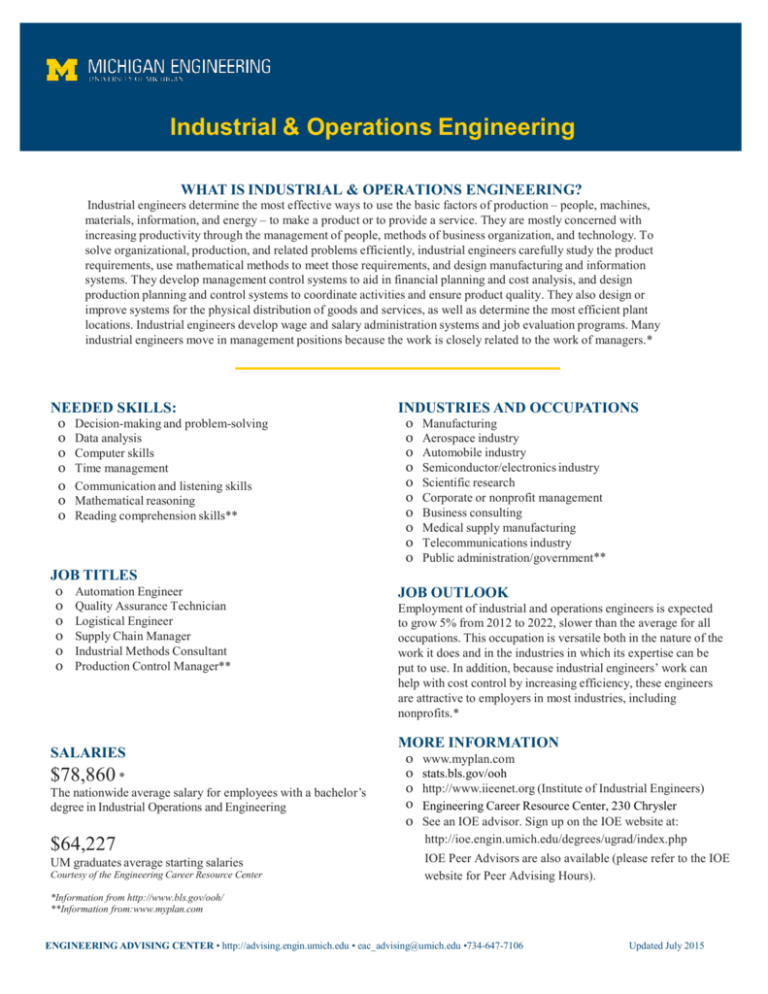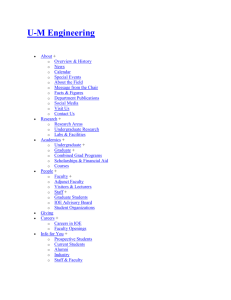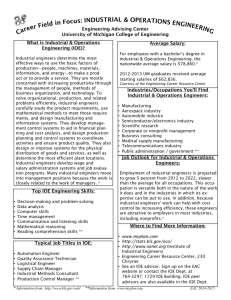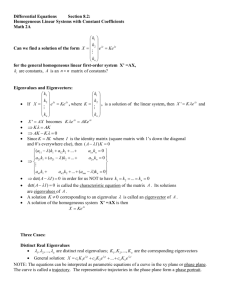Industrial & Operations Engineering
advertisement

Industrial & Operations Engineering WHAT IS INDUSTRIAL & OPERATIONS ENGINEERING? Industrial engineers determine the most effective ways to use the basic factors of production – people, machines, materials, information, and energy – to make a product or to provide a service. They are mostly concerned with increasing productivity through the management of people, methods of business organization, and technology. To solve organizational, production, and related problems efficiently, industrial engineers carefully study the product requirements, use mathematical methods to meet those requirements, and design manufacturing and information systems. They develop management control systems to aid in financial planning and cost analysis, and design production planning and control systems to coordinate activities and ensure product quality. They also design or improve systems for the physical distribution of goods and services, as well as determine the most efficient plant locations. Industrial engineers develop wage and salary administration systems and job evaluation programs. Many industrial engineers move in management positions because the work is closely related to the work of managers.* NEEDED SKILLS: o Decision-making and problem-solving o Data analysis o Computer skills o Time management o Communication and listening skills o Mathematical reasoning o Reading comprehension skills** JOB TITLES o Automation Engineer o Quality Assurance Technician o Logistical Engineer o Supply Chain Manager o Industrial Methods Consultant o Production Control Manager** SALARIES $78,860 * The nationwide average salary for employees with a bachelor’s degree in Industrial Operations and Engineering $64,227 UM graduates average starting salaries Courtesy of the Engineering Career Resource Center INDUSTRIES AND OCCUPATIONS o Manufacturing o Aerospace industry o Automobile industry o Semiconductor/electronics industry o Scientific research o Corporate or nonprofit management o Business consulting o Medical supply manufacturing o Telecommunications industry o Public administration/government** JOB OUTLOOK Employment of industrial and operations engineers is expected to grow 5% from 2012 to 2022, slower than the average for all occupations. This occupation is versatile both in the nature of the work it does and in the industries in which its expertise can be put to use. In addition, because industrial engineers’ work can help with cost control by increasing efficiency, these engineers are attractive to employers in most industries, including nonprofits.* MORE INFORMATION o www.myplan.com o stats.bls.gov/ooh o http://www.iieenet.org (Institute of Industrial Engineers) o Engineering Career Resource Center, 230 Chrysler o See an IOE advisor. Sign up on the IOE website at: http://ioe.engin.umich.edu/degrees/ugrad/index.php IOE Peer Advisors are also available (please refer to the IOE website for Peer Advising Hours). *Information from http://www.bls.gov/ooh/ **Information from:www.myplan.com ENGINEERING ADVISING CENTER • http://advising.engin.umich.edu • eac_advising@umich.edu •734-647-7106 Updated July 2015 Industrial & Operations Engineering WHICH IOE CLASSES SHOULD YOU START WITH? To start the IOE major, a good option is to take IOE 201 and IOE 202. These half-semester courses provide an excellent introduction to IOE. Then, many students elect IOE 265, IOE 333, IOE 334, and a 4-credit non-IOE engineering course. Also, remember that IOE students must take Math 214 (Linear Algebra and Differential Equations) instead of Math 216 (Introduction to Differential Equations). Read more about the IOE Department at: http://ioe.engin.umich.edu/ COURSE DESCRIPTIONS IOE 201 – 2 credits Economic Decision Making Prerequisites: Engr 100 and Engr 101. Overview of business operations, valuation and accounting principles. Time value of money and new present values. Practical team project experience. IOE 202 – 2 credits IOE 333 – 3 credits Ergonomics Prerequisite: Preceded or accompanied by IOE 265. Introduction to human sensory, decision, control, and motor systems in the context of visual, auditory, cognitive, and manual task evaluation and design. Problems with computer displays, illumination, noise, eye-hand coordination, as well as repetitive and high physical effort tasks are presented. Work place and vehicle design strategies used to resolve these are discussed. Operations Modeling IOE 334 – 1 credit Prerequisites: Engr 100 and Engr 101. Process of mathematically modeling operational decisions including the role of uncertainty in decision making. Basic tools for solving the resulting models, particularly mathematical programs, statistical models and queuing models. Cases may come from manufacturing and service operations and ergonomics. IOE 265 – 3 credits Probability and Statistics for Engineers Prerequisites: Math 116 and Engr 101. Graphical representation of data; axioms of probability, conditioning, Bayes Theorem; discrete distributions (Geometric, Binomial, Poisson); continuous distributions (normal exponential, Weibull), point and interval estimation, likelihood functions, test of hypotheses for means, variances, and proportions for one and two populations. Ergonomics Lab Prerequisite: Preceded or accompanied by IOE 265. Principles of measurement and prediction of human performance in man-machine systems. Laboratory experiments investigating human capabilities of vision, hearing, information processing, memory, motor processes, strength, and endurance. 4–credit non-IOE engineering courses may be chosen from the list below. You will need to choose one class from 3 of the 6 categories (for a total of 12 credits) by the time you graduate. 1. MECHENG 211 or CEE 211 or MECHENG 240 2. MECHENG 235 or ChemE 230 3. MSE 220 or MECHENG 382 4.BiomedE 458 or EECS 270 or EECS 314 5. CEE 265 or NERS 211 6. EECS 280 ENGINEERING ADVISING CENTER • http://advising.engin.umich.edu • eac_advising@umich.edu •734-647-7106 Updated July 2015






